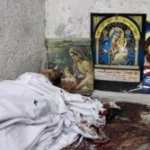
At least 24 Coptic Christians were killed in Cairo during clashes with the Egyptian Army on Oct. 9., Thomas Hartwell / Redux
From Egypt to North Korea, an unlikely minority suffers a plague of persecution
IN OCTOBER 2011, when the so-called Arab Spring took a dark turn in Cairo, Egypt, the social media and smartphone technologies that had aided protesters in their fight for freedom captured new and dangerous developments. On video-hosting websites such as YouTube, one can see footage of the Muslim mobs that began throwing rocks at Coptic Christians on October 8. These young Copts had been protesting the burning of a Coptic church in Aswan and the failure of the Egyptian authorities to respond satisfactorily. Frustrated with the traditional Coptic adoption of a dhimmi (subordinate religion) status toward Egypt’s Muslim majority, the young Copts defiantly left Coptic sections of Cairo to march through Muslim neighborhoods.
After the first rocks were thrown, the army came in to suppress the demonstration and ran down protesters with large military vehicles. Twenty-five Copts were killed, making this the largest mass killing of Christians that Egypt had seen in many years.
But this incident is about more than the Arab Spring turning into an antidemocratic winter, It is an example of the worldwide plague—growing in frequency and brutality—of the persecution of Christians. A Pew Forum study in 2011 estimated that Christians are persecuted, either by government or hostile social forces, in an incredible 131 of the world’s 193 countries, and they constitute 70 percent of the world’s population. The World Evangelical Alliance believes that 200 million Christians are being singled out for persecution at any one time. At a 2011 Organization for Security and Cooperation in Europe (OSCE) conference in Lithuania on the topic of Christian persecution, one delegate estimated that approximately 105,000 Christians lose their lives every year for their faith—a figure that translates into approximately one Christian killed every five minutes.
Compounding the problem is an unmistakable countertrend of inaction on the part of those, particularly in the West, who have the power to decrease or halt the persecution. There are several interrelated reasons for this inaction. Between the universal perception of a strong and dominant Christianity, over-cautiousness about the appearance of Islamophobia, a rising discomfort with Christian evangelism, and an ideologically rigid U.S. presidential administration, little is being done to effectively address the problem of Christians being persecuted worldwide.
Certainly, whatever the reason for the West’s tolerance of anti-Christian violence, it’s not lack of evidence. A search on YouTube of “Christian persecution” will yield, at random, footage documenting the beheading of a Korean Christian, Kim Sun-il, by a gang of Muslim militants in Iraq; churches, businesses, and homes burned in Orissa, India; a pastor in South Sudan whose hands were burned to stumps when a mob that had torched his church forced him back inside it; the rampage of a Muslim mob against a Christian village in Ethiopia; the beating and torture of house-church Christian leaders in China; the imprisonment of 235 Christians from 35 cities in six months in Iran. Imprisonments, beatings, tortures, rapes, forced conversions (almost always to Islam), and murders are narrated or documented from Morocco to Pakistan, from North Korea to Indonesia.
Reports by groups that track such incidents corroborate the plethora of online documentation. The May 2011 report by the Congressional Commission on International Religious Freedom describes in detail many of the gruesome anti-Christian crimes that can be seen on Internet videos, and then puts them into political and cultural context. The Christian organization Open Doors, which issues an annual listing of the worst-offender countries when it comes to the deprivation of religious freedom, puts North Korea as number one. Closely following are Iran, Afghanistan, Saudi Arabia, Somalia, the Maldives, Yemen, Iraq, Uzbekistan, Laos, and Pakistan. Also in the top 50 are Muslim-majority lands such as Libya, Syria, Oman, Egypt, Kuwait, and the Palestinian Authority and the dwindling handful of Communist states such as Vietnam, Cuba, and of course China.
The crisis is so bad in North Korea, according to Open Doors, that it is literally in a category by itself. The organization classifies countries into five categories. North Korea is the only one in the worst: “Severe Persecution.” The Hermit Kingdom’s “score,” calculated by allotting points based on the organization’s own questionnaire, is nearly 25 points higher than second-place Iran. “The situation in North Korea during this reporting period remains horrific,” the report states, claiming that “Christians do not have even the right to exist, according to the government.” Details of the ways these Christians have suffered are little known, thanks to North Korea’s self-imposed isolation and success in making Christianity look as though it has disappeared from its land. As a result, its Christians are left invisible, voiceless, nonexistent.
Since the first State Department Religious Freedom report was issued in 2001, the list of “countries of particular concern”—the official term for those thuggish states where the persecution of Christians and other religious minorities is particularly harsh—has remained remarkably constant. It includes many of the top offenders found on Open Doors’s listing and others as well: Burma, Malaysia, India, and Indonesia, to name but a fraction of them.
TO GET A BETTER SENSE of what this global persecution amounts to collectively, it’s worth examining its manifestations in an array of offending countries. The 2011 State Department Religious Freedom report offers a revealing distillation of the problem as it exists in Saudi Arabia. There, one al-Qaeda-linked Islamic gang of murderers went on a rampage against personnel of a Western (probably petroleum) company. “We began to comb the site looking for infidels,” crows one gang member. ‘We found Filipino Christians. We cut their throats and dedicated them to our brothers the mujahideen in the Philippines. We found Hindu engineers and cut their throats, too, Allah be praised. That same day, we purged Muhammad’s land of many Christians and polytheists.” After this orgy of murder, the group decided to cap the day’s events with a Koran study.
The problem in Saudi Arabia is not confined to citizen perpetrators. The State Department report points out that “freedom of religion is neither recognized nor protected under Saudi Law and is severely restricted in practice?’ The Saudi government also fails to define “private religious worship for all.” It permits its religious police, called the Commission for the Promotion of Virtue and Prevention of Vice (also known as the mutawwa), as well as personnel from the Ministry of the Interior to raid with impunity entirely private, non-Muslim religious gatherings. Almost all of these are Christian. In response to complaints about the steady drumbeat of anti-Christian propagandizing by official Saudi media outlets, the Saudi regime has said that its clerics condemn terrorism, even as statements on Saudi national television continue to call for the killing of Jews and Christians and the ultimate takeover of the United States by Islamic forces.
Iranian persecution of innocents is almost constantly in the news. Even so, official Iranian treatment of Christians has not shocked the world’s conscience as it should. Aside from China, Iran probably has the fastest-growing Christian house-church community in the world. Recently the Iranian regime received attention for sentencing to death a Muslim convert to Christianity, Yousef Nadarkhani. The 32-year old man had been the pastor of a group of Iranians, most of whom were converts from Shia Islam. In response to international objections, the Iranian Supreme Court has denied that Nadarkhani’s death sentence bad been confirmed. But there is little reason to believe this one convert will be spared, as death is almost always the official punishment for any Muslim who abandons his faith to follow another religion.
With Americans having spent 10 years in a war against radical Islam, the Islamist mode of anti-infidel persecution is rather well known. But the story of maltreatment of Christians at the hands of non-Muslim regimes deserves a much wider hearing than it has gotten. To this end, it’s worth considering the Chinese problem in some detail.
China, under its current Communist Party General Secretary, Hu Jintao, has initiated not only the most vicious crackdown on dissent since the days after Tiananmen Square in 1989, but also a concentrated effort to bring the country’s burgeoning Christian population under state control. Estimates of the number of China’s Christians hover at around 80 million—some unofficial estimates by Communist officials put the figure at 125 million, nearly 10 percent of the population. The problem for China’s Communist Party is that it doesn’t control this 10 percent. The State Administration for Religious Affairs, which is authorized by the Communist Party, has complete authority over China’s various religions. A subordinate umbrella
organization for Protestants, the Three-Self Patriotic Movement (TSPM)—for Catholics the equivalent is the Catholic Patriotic Association—admits that the number of Christians who attend its officially approved churches amounts to 20 to 30 million. So where are the rest of them? The other 50 to 75 million Chinese Christians belong to house churches, which are not registered with the government because their members don’t want to answer to the Communist Party. “Jesus Christ is the head of the church, not the Communist Party” is a typical refrain. Yet, according to TSPM gobbledygook, house churches don’t exist. TSPM officials claim that there is no such thing as a “house church.”
But Beijing officials have known for a long time that house churches do exist, and that they can be a source of headache for those trying to maintain party rule. One Beijing house church, the Shouwang (“watchtower”), composed largely of the capital’s upscale professionals, had been steadily growing since the 1990s. When it reached the apparently magic figure of about 1,000, however, it suddenly found itself unable to rent space from any commercial landlord. Hoping to get around the restriction, the church bought one story of a commercial office building, only to be denied possession of the keys. It has operated in limbo since last April, when its members tried to assemble in a public space near the building they had purchased.
Dozens were detained at the time, and hundreds more were detained over the next weeks and months. Early in December 2011, the church bravely announced its 35th outdoor meeting and told the story of yet more detentions.
Individual Chinese Christians have suffered far worse than well-placed bureaucratic stumbling blocks, as the case of Gao Zhisheng demonstrates. Gao, a prominent Christian human-rights lawyer, endured the first of several “disappearances” in 2006, during which time he was repeatedly tortured (toothpicks to his testicles was one favorite practice of the secret police) at unidentified locations. He is but one of many Chinese individuals targeted for their Christian faith. In typical Orwellian fashion, in January 2010, a Chinese foreign-ministry spokesman said he didn’t know where Gao was, but that he was “where he should be.”
It is important to note that the rise in incidents of persecution is occurring not only in countries that attempt to implement strict Islamic law or autocratic rule, but also in countries that we consider largely free. In democratic India, which by self-description has a secular system of government, one militant Hindu group, the Vishwa Hindu Parishad, recently held a rally demanding a change to the Indian constitution that would legalize the killing of Christian evangelists and of Hindus who convert to Christianity. In places with so many other ethnic and sectarian tensions, the plight of Christians is drowned out.
IN THE FACE of this pronounced blight, the State Department affirms earnestly that the administration of President Obama is unflagging in its efforts to draw attention in public and in diplomatic communications to the issue of religious persecution. It cites Obama’s own words: “Let us pledge our constant support to all who struggle against religious oppression and rededicate ourselves to fostering peace with those whose beliefs differ from our own,” he said in a proclamation from the White House on International Religious Freedom Day, January 15, 2010. “My administration will continue to oppose growing trends in many parts of the world to restrict religious expression. Faith can bring us closer to one another, and our freedom to practice our faith and follow our consciences is central to our ability to live in harmony. But other evidence suggests that the president is not inclined to go very far down any policy path that would make good on these proclamations.
Decisions and appointments illuminate the president’s priorities in this regard, Obama’s appointee to the position of ambassador-at-large for international religious freedom, Suzan Johnson Cook, confirmed in her position in 2011, has absolutely no documented experience whatsoever in religious-freedom issues. George W. Bush’s appointee to the same position, John Hanford, had worked for years on religious-freedom issues on the staff of Senator Richard Lugar, gaining hands-on experience in how to cozen foreign governments into releasing from prison Christian leaders they had arrested.
It is little surprise that when President Bush made his first official visit to China in 2002, he emphasized the societal importance of religious freedom during one of his early public speeches to students of Beijing’s elite Tsinghua University. He also made a visit to one of China’s officially permitted churches, against the advice of some State Department officials. Later, a member of an official American delegation to China was told by then ambassador Sandy Randt that one of the first questions the president asked was about the state of religious freedom in China. Obama’s first visit to China, in November 2009, was largely a Beijing-managed affair, during which he acknowledged human freedoms with only a brief and broad obligatory statement.
IT IS OBVIOUS ENOUGH that American support, official and private, for the religious freedom of Christians around the world ought to be automatic, but various factors are working to undermine this obligation. First, there is the accepted understanding that Christianity, the largest religion in the world, with about 2.1 billion followers, has won the global popularity contest among religions. Much of the West’s dominant civilization, moreover, has evolved from Christian institutions or movements. Numerical minorities and cultural underdogs tend to attract the most sympathy instead. The cause of persecuted Christians undoubtedly sounds like satire to those not familiar with the facts.
Second, some in the United States, especially in the cosmopolitan precincts of the media and academe, show evidence of a bias against evangelical Christians. Of the world’s great religions, none are so frequently a target of America’s biting comedians, satirists, and straight commentators as the much-maligned evangelicals. One need only recall the recent vitriolic uproar caused by nothing more scandalous than the winning streak of NFL quarterback Tim Tebow to grasp this point. This domestic bias translates into indifference to the sufferings of Christians in other countries.
Third, the same influential Western figures who think little of slighting evangelicals go to great lengths to avoid offending Muslims. This complicates efforts to criticize persecution of Christians carried out in the name of Islam. The developments of the Arab Spring have proved a further difficulty, as America threw its support behind the Muslim masses that are now turning from liberation forces into anti-infidel mobs. As John Eibner, Director of Christian Solidarity International USA, has put it, even Christian leaders are confused by how to frame the issue without being tarred as “Islamophobic” and are “uncertain how to relate the issue of Christian persecution to the strategic goals of U.S. foreign policy.”
Last, the robust defense of freedoms abroad—religious or otherwise—is not one of Obama’s fundamental concerns. Yes, he does support such freedoms and has at times spoken eloquently in their defense, but he has not shown much interest in initiating forward-leaning policies as did his predecessor, George W. Bush.
It is this last factor, the will and values of the American president, that is most important. It is the only one that can change the situation in a day. The president can decide to hold accountable offending regimes and parties and play a much-needed role in setting the proper tone by discussing the issue of religious persecution in real, not fashionable, terms.
Sadly, it is also the factor that seems least likely to change. Barack Obama has sought to reduce American influence in the world. Central to the administration’s preference for “leading from behind” is not only the withdrawal of American troops from current conflicts, but also the downplaying of American ideas and ideals. The president at heart remains an academic, and Western academia has committed itself to a near-total abandonment of the intellectual fields on which the real battles for freedom are fought. And so, we disappoint Christians at risk.
Until the West comes to terms with its responsibilities in the protection of these people, there is one action to which we in the free world have recourse. However much it helps those being persecuted is a matter of debate. But, still, we can pray.
Originally published in February 2012.
DAVID AIKMAN is writer-in-residence and professor of history at Patrick Henry College. He worked for 23 years as a foreign correspondent for Time and was bureau chief in Beijing, Jerusalem, and Berlin. He is the author of ll books, including the forthcoming novel Kidnapped in Gaza.



